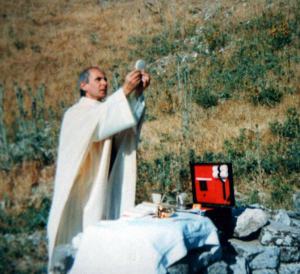A NEW MODEL OF PRIEST AND PARISH

Having said all this, we can now go into the specifics of the events that led to the murder of Puglisi (for this part, Father Cosimo Scordato’s contribution of his reflections were published in the journal of the Theological Faculty of Sicily). We will outline some indications that represent a precious heritage for a “border church” like the Sicilian one (this is a definition that was also used by the Pope).
Firstly, we must analyze the reasons for the clash between the mafia and Don Puglisi.
Don Pino’s model of priesthood in Brancaccio was unrecognizable to the mafia bosses. They had always made a show of being ready to accept and “respect” a priest who remained in the sacristy, who focused on the home and the church, and who organized processions – perhaps alongside “Uncle Totò” or the mob boss of the moment -, one that lives and lets live, as it were.
Instead, Don Puglisi chose to leave the sacristy and to share the problems, the dangers, and the hopes of his people. His wish as a parish priest was to assist in the liberation and promotion of his people.
Don Puglisi also created a new model of parish.
Among his initiatives, for example, were requests for services and a secondary school for Brancaccio.
He was constantly prodding institutions with demonstrations, petitions to the state, and civil protests.
He did all this in the light of day, away from the altar, with visible gestures that did not go unnoticed: they were well-defined choices made with the awareness of their disruptive effect on the balance sought by the mafia.
“We must not be silent”, said Don Pino to the most fearful parishioners in the days of the threats and attacks that preceded the ambush.
Citing St. Paul, he asked “si Deus nobiscum, quis contra nos?” “if God is with us, who will be against us? (Rm 8.31)
These choices allow us to glimpse an image of a Church that decided to be “weak with the weak”, to take the side of the lowest, a Church that believes in institutions, without substitutes or favoritisms.
Without substitutions is important because the Church should not occupy spaces or administrative tasks that are outside of its remit.
Without favoritisms, that is without giving in to pressure, to requests for favors and expectations of servitude to the politician on duty (when any of the latter arrived in Brancaccio, Don Pino sent them packing together with their electoral facsimiles).
This was the church of Father Puglisi, one that fell into the reality of its territory and its needs: this was the testing ground of a true evangelical witness.
And if the Church, the whole Church, could take this lesson to heart, then the figure of the little priest of Brancaccio, fallen under the blows of homicidal violence, would no longer bear the bloody mark of defeat, but the stigmata of a fruitful dignity, charged with the power of the resurrection.



Leave a Reply
Want to join the discussion?Feel free to contribute!